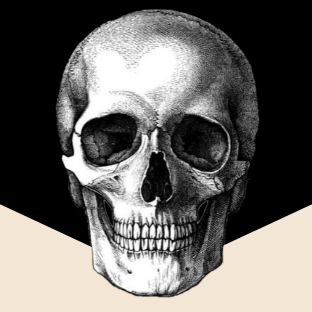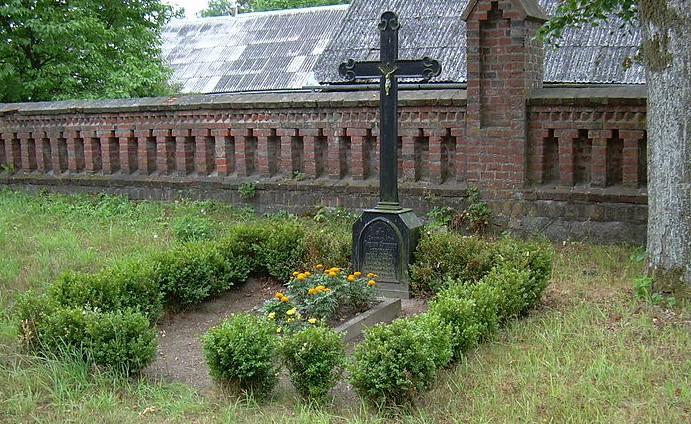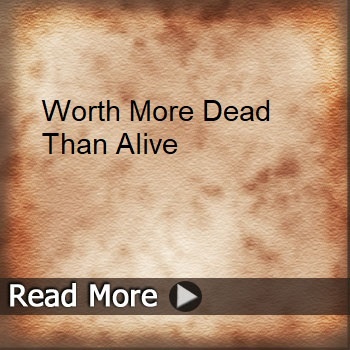By Philip J Martin
Your Excellency,
It has fallen upon me by the providence of God to relay to you the circumstances regarding the truly maleficent robbery of the grave of the late Father John Doyle. As you are well aware, there was not only a theft from the coffin but also a horrific dismemberment of the body itself. The curiosities of this heinous act I am at the moment keeping as a secret and hidden from the frenzy of the media, the trucks of which with their satellites pointed skyward remain parked outside the rectory. Many have crossed themselves at the door purporting to be worshippers.
Allow me to recount those facts as printed in the paper this morning that are indeed true. In the early morning of February 21st, while the night was cold and the darkness thick, the coffin of Father Doyle was unearthed and burglarized. Two men were responsible for the act, one of whom, Mr. Robert Cobb, is as of now recovering from an unsuccessful tongue transplant surgery at Baptist Hospital. I believe that, once mended, other rehabilitations of much greater urgency will commence without hesitation. The other culprit, Mr. Brooks Dawkins, is as of yet on the loose. As I understand it, however, the tip line established for the purposes of his capture has had little time to rest.
The reason I am penning this letter to Your Excellency is twofold. First, and less importantly, I can now testify truthfully that Dawkins is not in fact guilty of two of the crimes that he is suspected of having committed. Is he, on the other hand, a criminal guilty of offenses against the law and against God? Without question, this is the case, and I pray if he does not willingly surrender, that he will be captured and brought to justice. Second, and of much greater significance, I believe the truth of that terrible day to be of particular interest to our historic diocese and the glory of God. This I will unfold.
At around 11 AM on that day, Mrs. Sandra Juniper, a parishioner of ours, approached the doors of the church in hopes of lighting a candle before Our Lady in hopes of furthering the cause to which our parish has so diligently devoted itself over these last few years. This is her daily custom. What awaited her at the door was a man huddled in the fetal position. Mrs. Juniper, of all Catholics, has a heart of pure gold. She inquired as to his needs. Food? Water? Shelter? Clothing? Money? He said nothing, and she reached down to him in the posture of our Lord. Her hand rested on the gruff shoulder.
The man rolled over like a log to face her and sat up on his elbow. His mouth was full of blood. He could not speak, and as it dribbled from his lips and down his beard and over his clothing, he made the sign of the cross and pointed to his collar. Mrs. Juniper, obviously horrified, retrieved me from the rectory. This man was, as you now know, Mr. Cobb.
As Mrs. Juniper called for an ambulance, I attempted to pray over this helpless man, but he would not allow me. He swatted at my hands. With both fists he gripped my shirt and pulled my face intimately close to his. He struggled to utter a single word. Over and over, he spit out the blood and repeated the syllables. It was as if his life depended upon my understanding, but I could not decipher it.
“Conscience?” He shook his head. More blood dripped to the marble steps.
“Regression? Conditional? Admission? Additional?” Again, no.
Perhaps he was telling me his name. “Connor? Andrew? Ferguson? Michael? Johnson?” All incorrect. He waved his arms about and pointed over his shoulder. From down the road, the ambulance approached with rapid speed; I was running out of time.
When I saw the penance in his eyes and followed the line painted by his pointing finger through the church doors, I thought for a moment and muttered, “Confession?” At this, he lit up, but before he could mumble his sins, the paramedics arrived and placed him on a stretcher. I prayed a general prayer of absolution over the rolling body. My intention was to visit this man with the stole draped over my shoulders in the very near future.
The investigator was a brusque man, carrying in his face the weight of justice. I answered his questions as well as I could as his men roped off the church steps. He cared not that Cobb needed confession. Bulbs flashed and news cameras rolled. At long last, the mania subsided, and our historic church was returned to me. The reporters were given further instruction by the officers, all of whom departed sirenless and serene.
It was when the investigator knocked on the rectory door later that afternoon that I learned two important things about Mr. Cobb: he was addicted to methamphetamine, which did not surprise me, and that the evidence placed him at the scene of a grave robbery from morning. This was my first word of the incident, which saddened me to the point of grief. The misery that I had first felt upon the death of my grandfather as a young boy resurrected within me like a dormant virus. I leaned against the doorframe. The accomplice, Mr. Dawkins, was as of yet on the loose. The two of them had committed similar crimes across state lines.
“A warrant is being issued not only for his arrest the assault on Cobb and the burglary but also for the theft of body parts with the intent to sell,” he said as he lifted his hat to his head. “And one more thing. You may want to park your car down the street if you plan on going anywhere.”
“What do you mean?” I asked.
“When the media comes back, it won’t just be the locals.” He departed.
Sleep did not welcome me that evening. I stumbled about unable to finish my meal. With prayer card in my shaking hand, I carried out a vigil in the church through the night. Within me grief and peace held hands as if I did not have to choose between the two.
The following afternoon, this afternoon, I entered the confessional for our parish’s weekly scheduled penance when, to my surprise and horror, I discovered two items of note. The first was not truly one item but many, a stack of prayer cards upon which had been scribbled a story. There were as many as thirty, containing phrases such as “Switched them out” and “Banged my head.” Cobb had been here first. I have put together the dozens of little clues into the following narrative, which, while perhaps imperfect, is certainly the approximate truth of that awful morning.
Cobb and Dawkins are the latest in a series of thieves to unearth the dead in order to fund a meth habit (I pray, therefore, that this lessens their culpability). Nevertheless, Dawkins had seen on television a documentary about indulgences and such and must have come to believe in the wealth of every man of the church the world over. Once the body was dug up, they were hoping to find a skeleton emblazoned with jewels and precious metals. What they discovered was something much more startling but much less scandalous.
The odor of the body was not horrific but rather sweet. This was a shock, one that Cobb believed to be the sign of a kind of curse. Dawkins brushed off the notion and squashed his hesitancy. Like coroners, they examined the body with small flashlights, beginning with the tips of the fingers. All that was discovered was a simple ring and a metal cross that had fallen into the ribcage, items of little worth in the eyes of a covetous world.
It was when the light shined upon the skull for more than a moment that a discovery of inestimable beauty and value was revealed. Inside the jaw of this fallen priest lay an incorrupt tongue, pink and fleshy, glimmering with saliva as if the man had continued speaking while the rest of him rotted away. Cobb screamed and backed away like a man who has seen a ghost.
“Cursed! It’s cursed!” he said before tripping over a tombstone.
Dawkins approached and struck him in the gut. “Shut up, you idiot! Do you have any idea what this is worth, what this can fetch us? This will be the last corpse we ever dig up.”
“I don’t care; put it back. Close it up!”
“Every body part, every jewel, every ring rolling around in the trunk added together do not even touch the money that we’ll get for this one. So shut it!”
Cobb was once again and without warning overwhelmed by a proximate passion for drugs. He shook off his fears and pointed the light like a gun at the threatening jaw, to which the living tongue was still attached. The skull was ripped from the spine with the aid of a large knife and thrust into a brown duffle bag. It was tied up with an old shoelace. Cobb was handed this sack as well as the knife. Like a mother cradling a child, he secured the head in his lap as the pair drove from the cemetery in the direction of town.
The torment within that man must have been unbearable. Clearly, as is evidenced by my discovery in the confessional, his conscience like burning iron rods scalded him from the inside, cauterizing his heart, scarring it as a shield from the evil of the present moment. On the other hand, the dopamine and anticipated rush of a hit of meth rolled over in his mind like a refreshing wave, and drops of the cool water rippled through his veins. He bruised his skull on the window by repetitious banging. I anticipate that, when that automobile is discovered with or without Dawkins, the passenger window will be, if not cracked, stained with the same blood as my church floor.
They stopped for gas two blocks from this church, as the police report indicates. Dawkins went inside. Cobb sobbed and ground his teeth like corn at the miller. His eyes spun within their sockets, and he untied the sack. He drew out the skull with a grip so tense that the jaw was broken. He removed his coat and rolled the head of Father Doyle up in it. A few skulls were stored in the trunk, a sort of malicious, rolling mausoleum, and Cobb dropped one into the sack.
But what of the tongue? When Dawkins peered in and observed it missing, then Cobb’s motives would be discovered. He’d be a dead man. Without hesitation of any kind, I believe Cobb used the knife from the graveyard to cut out his own tongue. How could a man of sane mind do such a thing as that? This is precisely the point: he was not of sane mind. His heightened conscience and nerves dulled by a cold and imaginary dopamine gave him no time to consider consequences of any sort. This was a thoughtless act, for after placing it inside the new skull, the blood began to overflow from his mouth. His only choice was to abandon the car and traverse the road in search of help.
Dawkins returned to the vehicle. “Where are you going? Get back here!” he yelled. “I swear to God if you…”
Cobb ignored him and spit a trail of blood along the sidewalk. Consciousness was fading.
Dawkins split. Cobb entered through the doors of Saint Patrick’s, found the stack of cards, scribbled his story, abandoned his coat, and returned to the threshold where he lay until discovered by Mrs. Juniper.
Your Excellency, before I turned this coat over to the police, I decided to write you in order to request that you be the fourth to see its contents. Please come immediately.
I began this letter by stating that my purposes were twofold. As you can see not only did Dawkins not assault Cobb and cut out his tongue, but he also is not in possession of the head of Father John Doyle. It is now obvious to me that the word that Cobb desperately desired that I decipher on the marble steps of my parish was not “Confession” but, rather, “Confessional.” I still, however, hold out hope for the forgiveness of his sins and have scheduled a visit to him tomorrow morning.
And now to address my original intention and more urgent purpose in drafting this letter. As pastor of Saint Patrick Catholic Parish and successor of the deceased, I hereby request, given the evidence of his holy stance before the Lord our God and the miraculous fingerprint left by Him, that Your Excellency immediately petition to Holy See so as to initiate a Cause for the Beatification and Canonization of Father John Doyle, Requiescat in Pace.
In Christ,
Father Dominic Parker
Saint Patrick Catholic Parish
About the Author:
Philip Martin is a graduate of both Auburn University and the Franciscan University of Steubenville. In 2014 and 2015 his fiction was awarded Second and First Prize, respectively, in the Tuscany Prize in Catholic Fiction. His fiction, poetry, and non-fiction have all appeared in print, including in Bellum, Jesus The Imagination, and Negative Capability. Most recently he researched the life of St. Francis of Assisi for the documentary film Sign of Contradiction and his original biography of the saint appears in the coffee table book bearing the same name. He is married with four children, and writes from Daphne, AL.


